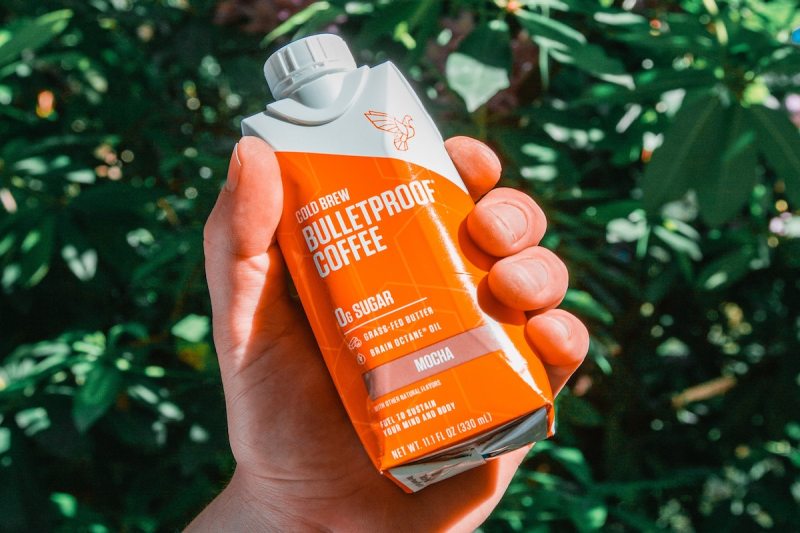There are probably as many different ways to prepare or take your coffee as there are days in the average month. Black, one sugar, a splash of cream, with an espresso shot, as a latte, cold brewed, double brewed—the list goes on and on. There’s also an avid tribe of coffee drinkers who add butter. That’s right; whether for purported health reasons and diet goals or simply because they agree with the often-tossed-around phrase that “everything tastes better with butter,” some people skip the milk, cream, and sugar and make their morning cup of coffee with grass-fed butter. Known as bulletproof coffee, this creamy coffee drink is a breakfast staple—if not offered as breakfast in its entirety — for many people practicing intermittent fasting or who are adherents of the keto diet, paleo diet, or other low-carb diets.
If you don’t regularly follow niche diet and wellness trends, there’s a good chance you’ve never heard of bulletproof coffee and it may sound entirely unappetizing. But, if you’re a lover of creamy coffee drinks and low-carb living, your interest may be piqued. Either way, if you’re like us and think it can be fun to learn about different diet trends and consider whether they appeal to you or may improve your health, keep reading for all the basics about bulletproof coffee. We’ll answer common questions including, “What is bulletproof coffee?” “How do you make bulletproof coffee?” and “Is bulletproof coffee healthy?”
Bulletproof coffee recipe

Ingredients
- 8-12 ounces of brewed coffee
- 1-2 tablespoons MCT oil
- 1-2 tablespoons grass-fed ghee or unsalted butter
Method
- Brew the coffee and add it to a blender with the MCT oil and ghee or butter.
- Blend for 30 seconds or until creamy.
What is bulletproof coffee?

Bulletproof coffee is a creamy coffee drink made with coffee, grass-fed butter, and MCT oil (medium-chain triglycerides) originally developed by Dave Asprey of the Bulletproof blog. Though the original iteration required the use of Bulletproof products, people now replicate the recipe with or without modifications using non-branded products or products from competitors.
Asprey created bulletproof coffee with the intention that it would replace a traditional high-carb breakfast like pancakes, cereal, or even oatmeal. Bulletproof coffee is targeted to those following the ketogenic diet, Paleo diet, general low-carb diet, or intermittent fasting eating pattern, because it contains essentially no carbohydrates yet, has a high-fat content to keep you satiated and energized while still maintaining metabolic ketosis.
In other words, fatty bulletproof coffee is typically consumed as the first meal of the day instead of eating any other type of breakfast. However, some people who just enjoy the taste of bulletproof coffee but are not interested in the potential ketogenic aspects of consuming it on its own, choose to eat other foods with the coffee.
How do you make bulletproof coffee?

The basic recipe for bulletproof coffee involves just three ingredients and takes about five minutes, all is said and done. As mentioned, although genuine bulletproof coffee is made with its special coffee beans (said to be free of the harmful mycotoxins found on most coffee beans), Brain Octane C8 MCT oil, and grass-fed ghee, you can use any coffee, MCT oil, or coconut oil, and ghee or grass-fed unsalted butter.
While bulletproof coffee is fairly simple, there are some things you can do to enhance your experience and enjoy a delicious, hearty cup of coffee. Here are a few of our best recommendations.
Consider the quality of your ingredients
The heart of your bulletproof coffee starts with using quality coffee beans. Using a coffee roast you enjoy and a brand you enjoy will seriously elevate the experience. Not only does the quality of your coffee matter, but the quality of the butter or MCT oil you use matters as well. Using the right type of butter is what makes this drink healthful. You don’t want to use margarine or any butter that contains inflammatory seed oils. Opt for organic or grass-fed butter whenever possible, which contains more nutrients than other forms of butter.
Start slowly
Adjusting to consuming large amounts of fat can be tough on the digestive system, especially if you’re not used to it. You may need to start slowly when adding butter or MCT to your coffee. You can cut down the amount of added fat in the recipe in half or even a quarter for a while to allow your body time to adjust.
Make it fun
The basic recipe of bulletproof coffee can be adjusted and tweaked based on your preferences. Consider adding flavored coffee syrups such as vanilla or hazelnut (sugar-free variety) to get more variety into your bulletproof coffee.
Benefits of bulletproof coffee

Bulletproof coffee is said to increase fat burning, boost metabolism, improve cognitive performance, increase energy and focus, and even protect the brain from age-related cognitive decline. Some of the benefits are attributed to the caffeine in coffee, which is a stimulant that can increase energy, focus, alertness, and attention. Grass-fed butter contains conjugated linoleic acid (CLA), which can reduce inflammation and may support brain health, while MCT oil provides a ready source of energy without triggering insulin secretion or spiking blood glucose levels.
When bulletproof coffee is consumed instead of breakfast after a full night of fasting, the body starts producing ketones for fuel. A state of metabolic ketosis has been found to mobilize stored fat for metabolism and increase weight loss. There is also some evidence to suggest it can improve symptoms of Alzheimer’s disease and epilepsy by optimizing brain function.
If you drink bulletproof coffee instead of a sugary breakfast like a Danish, bagel, boxed cereal with added sugar, or waffles, it may aid in weight loss and keep your blood sugar levels more stable. Most people who drink Bulletproof coffee report being surprisingly satiated with one cup due to the high-fat content.
Drawbacks of bulletproof coffee

Depending on how much butter/ghee and MCT oil you add when making your bulletproof coffee, each cup contains about 230 calories, 25 grams of total fat, and 23 grams of saturated fat, 0 grams of carbohydrates, and 0 grams of protein. Diets high in saturated fat have been associated with raising unhealthy low-density lipoprotein (LDL) cholesterol levels and subsequently increasing the risk of cardiovascular disease.
Besides fat, there are very few additional nutrients in bulletproof coffee aside from small amounts of fat-soluble vitamins like vitamin D, A, and K. Therefore, consuming bulletproof coffee instead of a nutrient-dense breakfast robs your body of the potential to get essential nutrients like protein, fiber, potassium, iron, calcium, vitamins, magnesium, and zinc. Depending on the composition of the rest of your diet, foregoing other nutrients at breakfast may set you back for the day and result in various deficiencies.
On the other hand, if you drink bulletproof coffee alongside other breakfast foods, you may experience weight gain unless you reduce your caloric intake in other areas of your diet since bulletproof coffee is calorically dense. Adding a cup of bulletproof coffee each morning to your regular diet without making compensatory changes would result in about a half-pound of weight gain per week.
Is bulletproof coffee healthy?

The answer to whether bulletproof coffee is healthy or not isn’t entirely straightforward. Bulletproof coffee certainly can be healthy, depending on your diet goals and the rest of your daily diet. However, it also has potential drawbacks and there’s a lack of conclusive evidence demonstrating its benefits.
Coffee is high in antioxidants, and for that reason, some studies have shown that drinking coffee in moderation can reduce the risk of certain diseases like heart disease and specific cancers, and caffeine can also increase metabolic rate. There is also some evidence suggesting that saturated fats, especially those in coconut oil and the MCT oil in bulletproof coffee actually help reduce bad LDL cholesterol and thus impart health benefits. However, the overwhelming body of evidence is that diets high in saturated fats increase the risk of high cholesterol, high triglycerides, atherosclerosis, heart disease, and stroke.
Therefore, regularly consuming saturated fat-laden bulletproof coffee is not necessarily advisable, particularly if the rest of your diet also includes animal proteins, full-fat dairy, and other processed food sources of saturated fats like baked goods. Depending on your current health markers, your family history of cardiovascular diseases, and your lifestyle habits, it may be a good idea to discuss bulletproof coffee and saturated fat intake with your doctor or a registered dietician.




